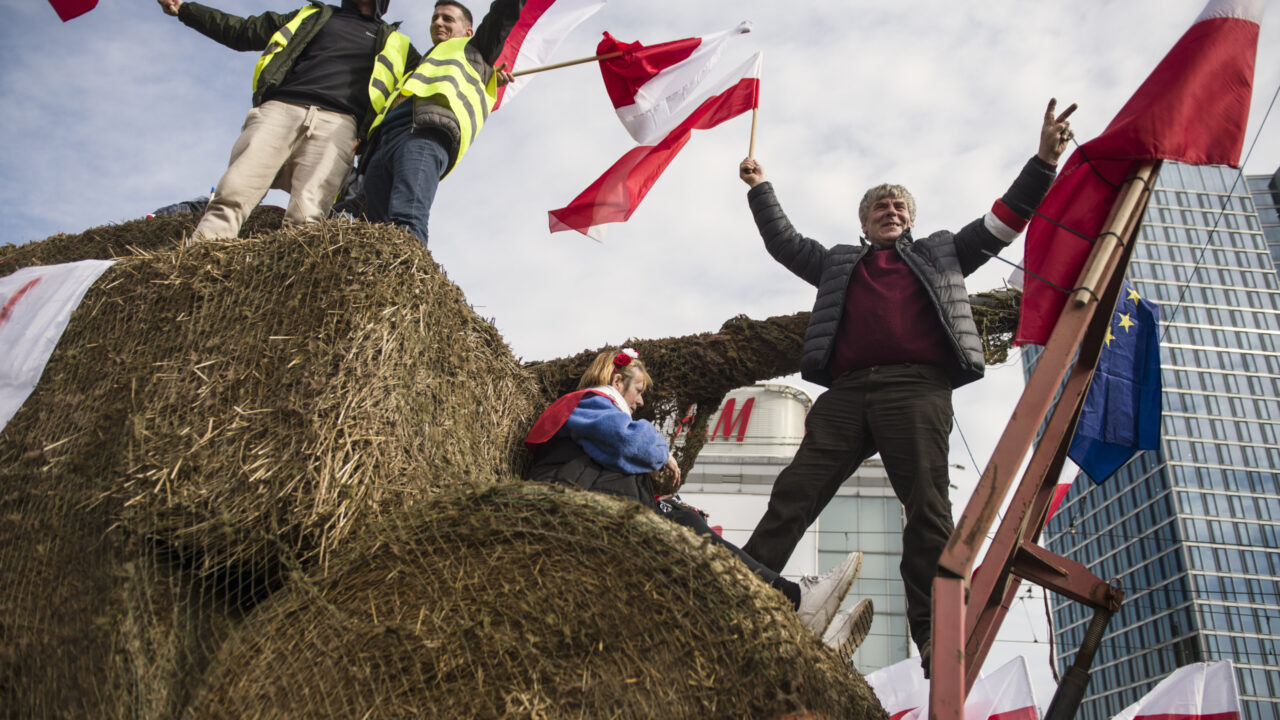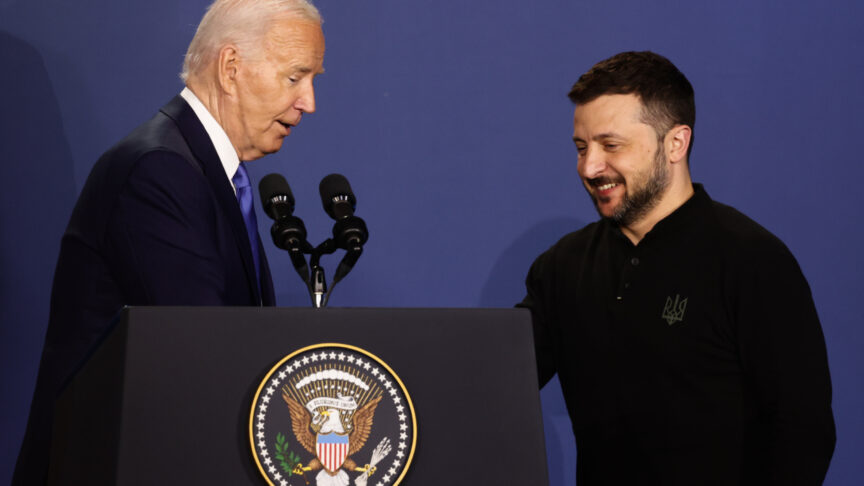War, business, and politics: Poland’s support for Ukraine amid agricultural protests
Mass farmers’ protests against Ukrainian agricultural imports have raised fears that the country’s strong support for Kyiv is faltering. But the protests are only one part of a much more complicated – and hopeful – picture
The Polish-Ukrainian border is blocked again. Polish farmers are protesting and blocking not only border crossings but also main roads and entrances to cities – with over 200 blockades in total across the country. They set off with their tractors, just like the farmers in France, the Netherlands, and Germany, to protest against worsening farming conditions and the declining profitability of agricultural production. They blame the European Commission and its European Green Deal, which imposes new rules for agriculture such as limiting the use of artificial fertilisers or fallow land.
New regulations for climate protection, however laudable their adoption, mean new costs. These costs are already among the highest in the world, undermining the competitiveness of European agricultural producers in the global market. And yet the European Union is one of the largest exporters of agricultural and food products in the world. This position is spectacularly illustrated by the small Netherlands, which is the second-largest exporter of agricultural products globally in terms of value after the United States.
It is the fear of losing their competitiveness that has driven Polish farmers to add a second cause to their protests – what they consider unfair competition from Ukrainian farmers and producers. For this reason, they are demanding a restriction on imports of agricultural products from Ukraine. To manifest their anger, they are no longer only blocking border crossings, but are also spilling grain from Ukrainian trucks and train carriages. These actions are provoking indignation from the Ukrainian side; President Volodymyr Zelensky has already spoken out about the blockades and Polish claims on several occasions.
This has raised the question of whether Poland remains Ukraine’s closest ally in its war against Russia’s aggression, or whether, as recently suggested by the editors of European Pravda, it is now waging a full-scale trade war with Ukraine. Unfortunately, or perhaps rather fortunately, the reality is more complex, and its explanation should start with basic facts.
The most important fact is that the Polish farmers’ protests are supported by the vast majority of Polish society, as much as 77.2 per cent according to an opinion poll conducted by the Polish Institute for Social Research and Market for the Rzeczpospolita daily newspaper. Only around 10 per cent oppose the protests. This support unites Poles across political divides. Unsurprisingly, the protests are also supported by politicians, and not only those in opposition to Donald Tusk’s government. The Polish prime minister himself also sympathises with the farmers, as do many ministers.
This is unsurprising if you look at the statistics showing support for the various political parties. Tusk’s government has been in power for a short enough time that it does not yet bear responsibility for the situation. After all, the protests against Ukrainian grain and agricultural imports began under the Law and Justice government, and its appointee, Janusz Wojciechowski, is the European Commissioner for Agriculture. As a result, politically, the opposition Law and Justice party is losing the most from the current crisis, although of course it is Tusk who has to solve the problem.
Local elections will take place on 7 April, and the European Parliament elections will follow two months later. Tusk’s government needs to weaken the right wing and ensure that the representatives of the currently ruling coalition win in as many provinces as possible. At the moment, they are in power in half; but if things go well, they can win a clear majority. Consolidation is also at stake at the municipal level. In the European Parliament elections, there will be a fight for every seat. And it is clear that any ill-considered reaction towards the protesters, such as the use of police force, including at the border, would translate into increased support for the Law and Justice party or other far-right candidates.
Those in power in other European countries have a similar problem: the greatest threat today is the rise of support for the extreme and populist right in most European countries. In most cases, the populist-right parties and their politicians hold either overtly pro-Russian or, at best, ‘realistic’ attitudes towards Russia, and argue for the need to end the war in Ukraine quickly through negotiations. In the European Parliament elections, therefore, mainstream parties throughout Europe hope to obtain a result that will enable the next European Commission to continue the existing policy of support and assistance to Ukraine.
These issues stand out in sharp relief in Poland. But mass support for the protesters does not signify an anti-Ukrainian turn in Polish society. The results of a recent, as yet unpublished, survey conducted by More in Common Poland show that 67 per cent of Poles think that “the European Union and its member states should provide economic and military support to Ukraine for as long as necessary”. The opposite view is held by just 22 per cent. Ukraine’s membership of the EU, meanwhile, is currently supported by 53 per cent of people, and opposed by 30 per cent.
Mass support for the protesters does not signify an anti-Ukrainian turn in Polish society
While we should rejoice at the first result, the second shows that support for Ukraine’s strategic non-military goals is on much weaker ground. Various surveys from other European countries show that Polish society is among the most supportive of Ukraine. According to recent polling by the European Council on Foreign Relations, Poles are also – alongside the Swedes and the Portuguese – the most convinced among European publics that Ukraine will win the war and that it should be supported until it regains the territories occupied by Russia. In France, Germany, the Netherlands, and many other countries, most are betting instead on urging Ukraine to reach a compromise with Russia.
Awareness of this socio-political context is essential, and it is worth bearing it in mind during discussions about the situation on the Polish-Ukrainian border. Ukrainian experts are right that the export of grain and agricultural products from Ukraine to Poland is not having an adverse effect. One of Poland’s top agricultural market experts, Mirosław Marciniak, who runs the InfoGrain analytical service, explains that the fall in prices is a result of global markets and that prices have continued to fall even after the introduction of the import ban.
Marciniak points out that there are only two ways to react in such a situation. Agricultural producers need to better analyse the risks, which cannot be completely eliminated. Politicians in power should, in turn, develop infrastructure to facilitate the storage of surpluses and exports. The Polish government has neglected to do this over the past two years, unlike Romania, leading to a redirection of much of the cross-border traffic from the Polish border to the Romanian one.
Other experts point out that Poland not only imports agricultural products from Ukraine but is also the main exporter of food to Ukraine. Dariusz Szymczycha of the Polish-Ukrainian Chamber of Commerce explains that in 2023 the value of Polish exports reached $950 million (in 2022 it was $881 million), overtaking those from Turkey, Germany, and Italy. He adds that between January and November 2023 Poland’s total exports to Ukraine amounted to $10,163 billion (a 17 per cent increase compared to the same period in 2022), while Ukraine exported $4,053 billion in goods to Poland (a 27 per cent decrease compared to the previous year).
These basic economic facts need to be constantly emphasised, just like the broader context of the border blockade and the difficulties it creates for the Ukrainian economy and war effort. This was the argument presented in a recent position paper by the Stefan Batory Foundation, which together with the Kyiv-based International Renaissance Foundation has been running the Ukraine-Poland Forum for years. It is precisely such facts that should form the basis of a rational Polish-Ukrainian debate.
However, it is well known that even the most important facts only have a limited impact on the political and social reality. Responding to this reality requires good knowledge of the local context and a sense of proportion. The reactions of the Ukrainian public to the situation on the Polish border are fully understandable; Ukrainians have the right to feel bitter not only about the blockades and restrictions on trade with Poland, but also about the inability of the Polish authorities to quickly resolve issues that have a direct impact on Ukraine’s ability to fight back against Russia.
However, Ukrainian politicians and experts should always separate emotions from analysis and strategic calculus in their reactions. Poland as a state and society is invariably among the leaders of support for Ukraine and its goals in the war and after its conclusion. This is important capital in every stage of negotiating in the EU, including on the next sanctions against Russia, the next aid allocations, and the next steps in Ukraine’s accession process. Statements that Poland is no longer an ally of Ukraine, is betraying it, or even supporting Russia could become a self-fulfilling prophecy and actually lead to a change in public attitudes, which could ultimately affect state policy.
Yes, the border blockades and trade obstructions are more than inconvenient for Ukrainian society and the state, and should be resolved as soon as possible. However, for all their inconvenience, they are not of strategic importance. What is of strategic importance is maintaining as much support as possible for Ukraine over the next months, perhaps years, of war and during its post-war reconstruction and European integration. We need to remember this on both sides of the border, especially in circles that influence the public debate.
This article was first published in Ukrainian in European Pravda on 21 February 2024.
The European Council on Foreign Relations does not take collective positions. ECFR publications only represent the views of their individual authors.



